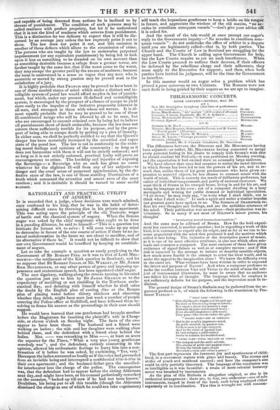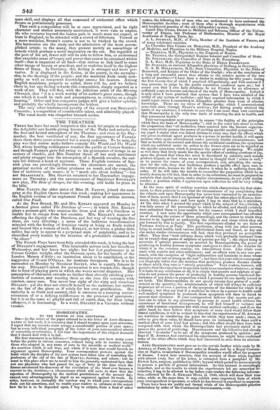PHILHARMONIC CONCERTS.
SIXTH CONCERT—MONDAY, MAY 30.
Aar I.
New MS. Descriptive Symphony (first time of performance in this country) Scene, Miss Basserro, •• Ah! parlate " (II S.terijiziod'ilbramo) CIIIAROSA.
Concerto, F minor. Pianoforte, Mr. W. S. BEntsErr Bennerr. Scene, Mademoiselle Peet:tr.'. L'Automne "
Overture, Egmont
ACT 21.
Sinfonia in D. No. 2 Mozaar. Terzetto, Miss BASSANO.Mademoiselle PACINI, and M. V RUGT,
• Pria di portir " ( Idomeneo) MOZART.
Concerto, D minor, Violin, M. Atomizes M, .Mien.
Scene, M. VHCOT, " Ch11111118 paternels" (Joseph) M Enos—
Overture, (Calypso) WINTER. Leader, Mr. F. CRAMER—Conductor, Mr. MOSCHITLES.
The differences between the Directors and Mr. MoscaTLes having been adjusted—or rather, Mr. MOSCHELES having consented to merge every personal feeling in his :desire to comply with SPORE'S wish that he should conduct his Sinfonia—it was performed on Monday evening, and the expectation it had excited drew an unusually large audience.
We have oftener than once had occasion to notice the novel direction in which SPORE has been led to test the powers of his art, and to re- mark that, unlike those of his great predecessors who have given ex- pression to material objects, he has chosen to connect music with the world of mind. This is scarcely the result of deliberate preference, but rather of individual temperament, and partly of national character. We must think of SPORE in his tranquil home, living in and for his art, and using its language as his own ; not of a composer dwelling in a busy metropolis and writing for public demand or individual speculation. " I sit down," he may truly say, "to write what I shall think, not to think what I shall write." In such a spirit and under a-similar impulse our greatest poets have spoken to us. The Sonnets of SHAKSPERE re- flect his own thoughts and feelings, and are the unbidden utterance of his mind. Their publication was an accident—their production was in- voluntary. So in many if not most of MILTON'S minor poems, his thoughts " Involuntary moved harmonious numbers."
And the same may be affirmed of SPOHR. How far the bold experi- ment has succeeded, is another question ; but in regarding a work of this kind, it is necessary to regard also its origin, and as far as we can to be- come acquainted with the mind that produced it and the motives which called it into being. The imitative or the descriptive power of music, as it is one of its most effective attributes, is also one which often mis- leads and ensnares a composer. The most eminent of these have given evidences of signal failure as well as of complete success : and if this risk is incurred in the attempt to imitate or describe sensible objects, how much more fearful is the attempt to enter the ideal world, and to make the appeal to the imagination alone ! We know the difficulty even in the sister art. What volumes have been written in order to expound the intent and purpose of DANTE! And when a composer professes to make the conflict between Vice and Virtue in the mind of man the sub- ject of instrumental illustration, he must be aware that no audience can follow his train of thought. The language which he employs is not sufficiently definite for his purpose, and the impression must be in- distinct. •
The general design of SPOHR'S Sinfonia may be gathered from the ar- gument prefixed to it, of which the following is the translation by Pro- fessor TAYLOR-
" FIRST PART—ENFANCY.
" O'er childhood's bright and blessed age No dark or threatening tempest lowers : Nur anger's storm nor passion's rage Disturbs its pure and tranquil hours : Even should temptation's arts assail, They pass—like clouds before the gale.
SECOND PART—AGE OF CONFLICT. " But in the youth's impetuous mind, By pride assailed, by passion test, Calm reason is to rage resigned, And in the whirl of passion lost : In vain religion's mild control Seeks to restrain his troubled soul. " THIRD PART—FINAL TRIUMPH OF VIRTUE. " The tempest and the strife subside, The storms of pride and passion cease : Within the breast again reside
Devotion's calm and virtue's peace."
The first part represents the innocent joy and sportiveness of child- hood, in a movement replete with grace and beauty. The storms and strifes of youth and manhood succeed ; and here the composer's aim could be only partially discerned. The language of the conclusion was as intelligible as it was beautiful : a strain of more celestial harmony never was breathed by instruments. As the plan of this Sinfonia is altogether original, so also is its orchestral arrangement : there are, in fact, two orchestras—one of solo instruments, ranged in front of the band, each being employed either separately or in combination. This idea is wrought out with consum-
NIEDESSIETER. BEETUOVEN.
mate skill, and displays all that command of orchestral effect which Szsasta so preeminently possesses. That such a composition will be at once appreciated, and its right character and station accurately ascertained, it were vain to expect He who ventures beyond the beaten path in music must not expect, at least in England, to be attended with a crowd of followers. Viewed as a mere musician, Srona's coarse is not to be tracked by the crowd. His harmonies are the study and the admiration of the most accom- plished artists : to the many, they present merely an assemblage of sounds which produce a novel impression on the ear. But regarded as the poet of his art, fewer still will be able to follow him, or understand that exquisite sense of beauty and power that cannot be contained within itself—that is impatient of all limit—that strives to link itself to some other image of beauty or grandeur, and to enshrine itself in the highest fbrms of fancy. In Germany, this feeling is stronger and more per- vasive. It is displayed in the fiction, in the poetry, in the metaphy- sics, in the theology of the people ; and the musician finds ready sym- pathy as well as competent knowledge among his hearers. Among English musicians, properly so called, there will be, and we believe there is, but one feeling towards this composition, simply regarded as a work of art. They will feel, with the judicious critic of the Morning Chronicle, that " it is a work worthy of its author's great name, though one which it would be rash and presumptuous to criticize on a single hearing." Other and less competent judges will give a bolder opinion, and probably the wholly incompetent the boldest. The only other instrumental novelty of the concert was BENNETT'S Concerto ; a composition of considerable talent, and admirably played. The vocal music was altogether beneath notice.



























 Previous page
Previous page